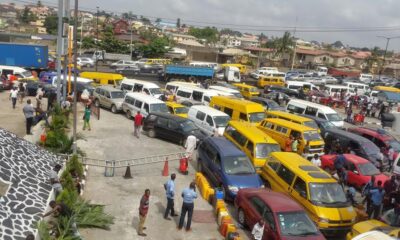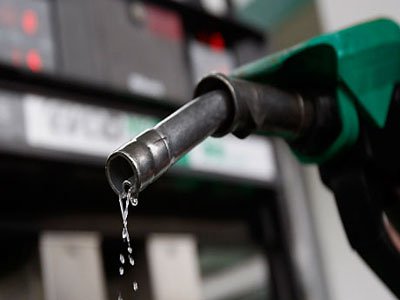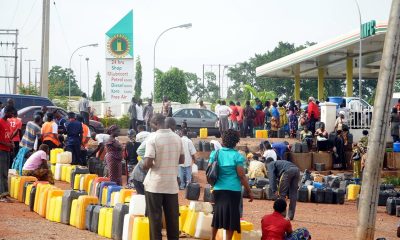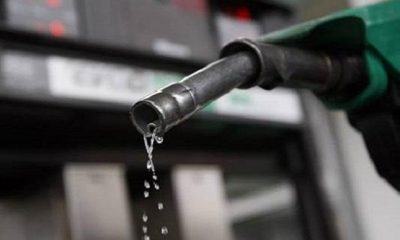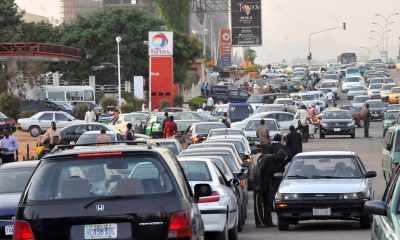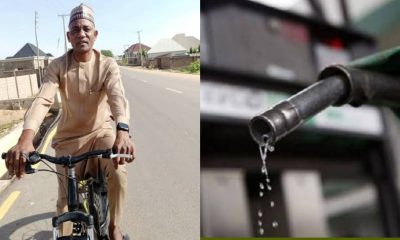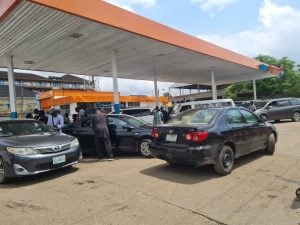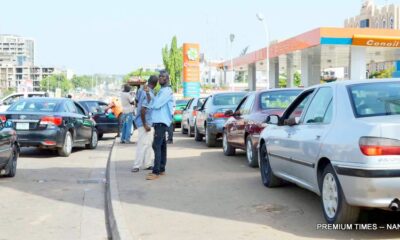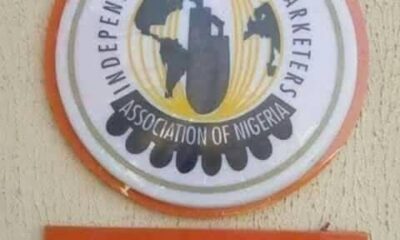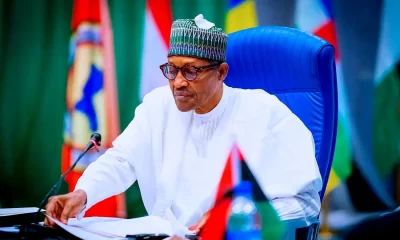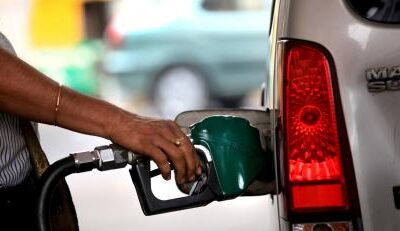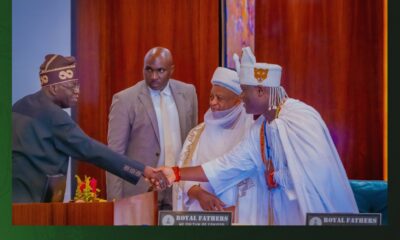NEWS
Bleak Christmas: Millions stranded across Nigeria as fuel scarcity worsens
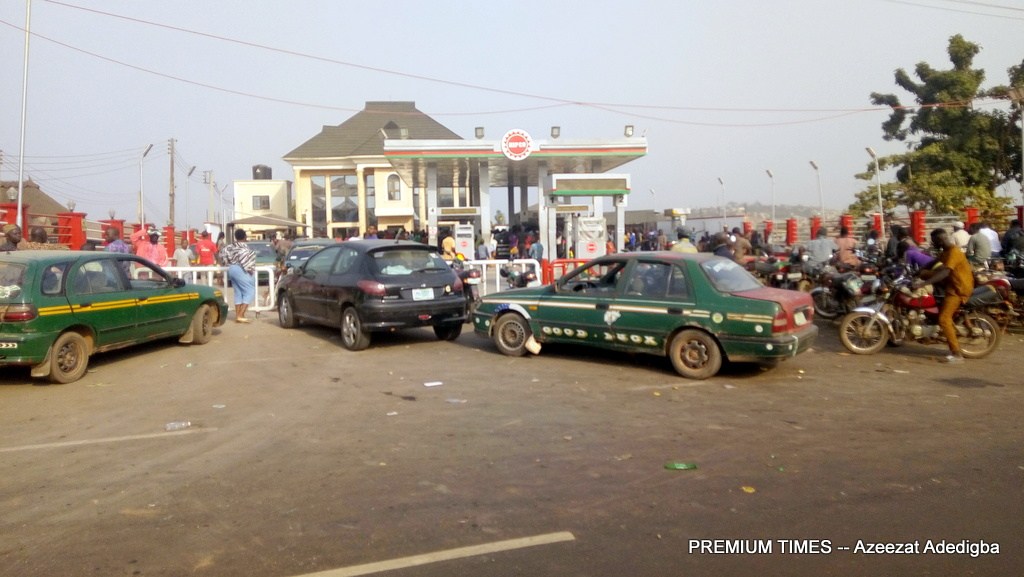
On a day Nigerians join the rest of the World to celebrate Christmas, many are left stranded at filling stations as the fuel scarcity bites harder across the country.
Thousands of motorists were still on the fuel queues till early hours of Christmas day, as many filling stations did not sell petrol and the few that sold did so at exorbitant prices. This is despite the Nigerian National Petroleum Corporation, NNPC, repeatedly assuring Nigerians that it had and is distributing more than enough petrol for local use.
On Friday, the NNPC said it had increased daily volume of fuel supply from the usual 35 million litres to about 80 million litres. It said six of the major petroleum marketers – Total, Forte Oil, Oando Plc, MRS, Conoil and NIPCO Plc – had been drafted to help truck out products from various depots in Lagos to all parts of the country.
But the efforts appear inadequate to translate into any significant solution at the filling stations, even in the Nigerian capital, Abuja, where most filling stations were out of fuel, with most Nigerians abandoning their church services on Sunday to queue for petrol.
As the fuel crisis worsened, many Nigerians accustomed to travelling to their home states for Christmas were stranded at motor parks. Most could either not afford the almost 100 per cent increase in transport fares or had to cancel for lack of transportation.
ABUJA SITUATION
By Sunday, most of the filling stations in Abuja did not have petrol to dispense to customers. The few that had, including the NNPC mega filling station along Olusegun Obasanjo Way in the Central Business District, and the two retail outlets directly opposite the NNPC headquarters – Conoil and Total – had very long queues of motorists who formed a loop along the adjoining roads.
One of the motorists, who spoke with PREMIUM TIMES late on Sunday night, painted a grim picture of frustration, as he said he could not buy fuel by 11.30 p.m, despite abandoning his church service at about 1.41 p.m. to join the fuel queue at the NNPC filling station.
“It was confusion galore. Taxi drivers who could bribe the security at the entrance were allowed to beat the queue and enter from the exit gate. I can’t describe how long the queue was. It is better imagined. At about 9.30 p.m., sales was stopped, as security situation became uncontrollable.
“None of the filling stations around the area, namely Advance Link, Forte Oil, Oando, were selling. The black market hawkers sell 10 litres of the commodity for N4,500-N5,000, from N3,500 the previous day,” he said.
All the six filling stations in Berger Roundabout to Jabi, Utako and Life camp area in Abuja were not selling petrol
Along the Karu-Gwarimpa highway, only the NNPC mega station was selling on Sunday. But, the queue stretched to about four kilometres.
Along Nyanya-Karu-Karshi Road, none of the more than seven filling stations operating in the area sold fuel Sunday afternoon.
Despite not dispensing petrol, some of the filling stations still had long queues of motorists who waited patiently.
A motorist in one of the filling stations told our correspondent that some of the station operators usually lock up their stations deliberately to attract more desperate customers who would offer to buy above the official price of N145 per lire.
“Black market is the thriving business along this road, as sellers openly flag vehicles down for patronage. Officials of the regulatory agencies are rarely seen around the area,” the motorist said.
At Kpegyi Junction, a tricycle operator told our correspondent that although fuel was being sold for as high as N350 per litre, motorists were still buying with enthusiasm.
Along Zuba-Gwagwalada axis of the Federal Capital Territory, most motorists seemed to have resigned to fate, as they depended on the black market for fuel.
At the Oando Filling Station, Tunga-Maje, customers paid as high as N600 per litre. Most the passengers who could not afford the high fares as a consequence of the fuel scarcity had to cancel their trips at the park.
Other stranded travellers who could not afford the exorbitant transport fares resorted to travelling on Dangote and BUA cement trailers at Zuba, Tunga-Maje, Giri, and Gwagwalada going to Okpella and Lokoja respectively.
SOUTH WEST
In Abeokuta, Ogun State, some of the filling stations visited by PREMIUM TIMES reporter in Leme, Iyana Mortuary, Idi Aba, Abiola way, and Lantoro on Sunday did not sell petrol.
For instance, Ayomide filling station in Iyana Mortuary, Sunny Yinka filling station in Leme, Fatolas in Madojutimi axis of Abiola Way, Oyinkansola filling station in Lantoro, Salijay Rantipe Ventures in Abiola way were not selling.
Although Ayomide filling station in Iyana Mortuary and Fatolas in Madojutimi axis of Abiola way, were open to customers, attendants only sold diesel and kerosene.
Nobody was ready to offer explanations why petrol was not being sold at the stations. It was not clear if they were hoarding.
At First Option in Aladesanmi axis of Abiola way, service was disrupted every other hour, for reasons nobody was ready to speak about.
Although the NNPC station around Oke Mosan Secretariat was selling petrol at N145 per litre, preference was given to vehicles with official registration plate number, while others wallowed in very long queues.
“I have been on this queue since 2 a.m., but these officials do not queue. They just drive in and buy,” Muraina, a taxi driver, told our correspondent on Sunday evening.
Amid the confusion, black market thrived around the NNPC filling station in the area, with 25 litres of fuel sold for N10,000.
In Oyo State, at Farbas filling station, along Oyo-Ogbomoso road, petrol was sold for N220 per litre, while fuel hawkers sold for as high as N250.
In Ado-Ekiti, residents told PREMIUM TIMES that they paid between N500 and N600 per litre on the black market to buy petrol as most filling stations were not dispensing.
“This (Sunday) morning, only Bovas was selling, there was no other fuel station that was selling, and you can imagine the queue that was there,” Yemi Ola, a resident of Ado-Ekiti, said.
“The situation has become so bad I could not go to church today.”
The situation in Ekiti eventually forced the state governor to sell 80 per cent of the reserves meant for the governor’s office. The petrol was sold at the official N145 per litre, but no resident was allowed to buy above 25 litres.
In Osun State, most of the filling stations did not also dispense petrol.
Some vehicles were packed by the gates of the fuel stations with the hope that they would eventually sell.
The few filling stations that sold did so at N250 per litre, but still had long queues.
A resident of Osogbo, who gave his name as Toba, said because motorists expend great effort to obtain a few litres of petrol, they vent their frustrations on commuters who have no choice in paying the exorbitant fares to different parts of the city.
“The drivers have become so angry that once they give you their price when you stop them, they no longer wait to negotiate, they just drive off,” he said.
In Ondo State, most residents resorted to the black market. The few stations that sold petrol, sold for about N250 per litre amidst the belief many had tampered with their meters to cheat customers.
A resident who bought the product at CWay Petroleum in Oda, Akure, on Sunday complained bitterly when he saw there was no difference in quantity in the fuel served in two transparent plastic kegs of four and five litres respectively.
In Lagos, the state that consumes the largest volume of petrol in the country, many filling stations sold at N200 per litre.
More filling stations in the state joined the growing number of stations without the product while few who had the product sold between N 170 to N200 per litre with long queues.
Most stations at Ikorodu, Epe, Imota, Ibeju-Lekki and Ajah were seen selling petrol at N200 per litre.
At Be Happy, Mallo, Bravo, Domino, and Dhikram filling stations situated at Ikorodu, petrol was selling at N200 per litre while motorists were mandated to pay N50 as ‘commission’ to the attendants, a News Agency of Nigeria correspondent observed.
Mobil, Oando and Total filling stations along Lekki-Epe Expressway sold at N145 per litre. But there were long queues while motorists were seen buying fuel from `black market’ along the road.
Some independent filling stations branded with NNPC colour were also selling at N170 per litre although their dispensing meter showed N143 per litre.
Black market operators at Monsinmi depot were selling a 30-litre gallon at N6, 000 with inter-state commercial and private motorists packed along the road to fill their tanks.
NORTH-EAST
In Maiduguri, the Borno State capital, most of the filling stations did not sell petrol on Sunday.
Hawking of the product has since taken over the streets, with motorists forced to pay as high as between N195 and N220 per litre for petrol
“Many filling stations that you see locked up in day time have petrol. They are usually opened at night”, said Abdullah Idris, a petrol vendor along Maiduguri-Kano highway.
“They sell for us at N180, or N185 per litre, and we sell at N210 or N220, as the case may be,” Mr. Idris said.
The impact of the fuel crisis on transportation in the Boko Haram-troubled state has been huge, with commercial tricycles operators and cab drivers raising transport fares by more than half the usual price.
Apagu Amos, an apprentice father of three, told PREMIUM TIMES that his family had to put off their planned trip to the village for Christmas, because they could not afford fuel for the car that would have conveyed them.
“This year we have forfeited our usual annual Christmas trip to the village in Askira-Uba. We cannot afford to get stranded along the highway, because of scarcity of fuel. I can’t afford to fill my tank with fuel at N220 per litre for the journey,” he said.
SOUTH-SOUTH
In Uyo, Akwa Ibom State, the fuel crisis remains unabated, as petrol is sold between N210 and N250 per litre in most filling stations.
Some consumers said it was sold for as high as N300 at the outskirts of Uyo and environs, with most of the filling stations belonging to major petroleum marketers closed on Sunday.
SOUHT-EAST
In Abakaliki, the Ebonyi State capital, only few filling stations were selling when our correspondent went round the city.
Most of the stations sold petrol at between N270 and N300, with many others closed.
The usually busy roads in the state capital were almost free of vehicular movement, as most residents either travelled home for Christmas or were on queue at the filling stations.
Transport fare in the city has almost doubled. Passengers at the Peace Park, travelling from Abakaliki to Enugu, paid N900 on Sunday against the former N500.
In Awka, the Anambra State capital, a resident, Emmanuel Muruako, told our reporter that fuel was sold at N300 per litre in most filling stations, while black market price was N350 per litre.
The only stations still selling at N145 per litre were the NNPC filling station and Staniel filling station. Both had very long queues.
The situation resulted in a drastic increase in transport fares in the state. On Sunday, a trip from Awka to Onitsha, which normally costs N300 to N400, went for between N800 and N1000.
The situation was the same in filling stations in Enugu, Umuahia and Owerri, capitals of Enugu, Abia and Imo states respectively.
In Enugu, a litre of fuel was sold for N250 in most filling stations owned by the independent petroleum product marketers.
A correspondent who visited the filling stations in the city on Sunday observed that the product was sold for N250 per litre. The product was readily available with little queues.
Only few filling stations sold at the regulated price of N145, with resultant long queues. These include Total, Oando and NNPC filling stations as well as the filling stations of other major marketers.
The manager of one of the independent marketers’ filling stations in New Layout, Chidi Ugwu, said the increase in price was due to the recent difficulty in getting the product from the Port Harcourt depot.
“When the supply at the Port Harcourt depot normalises, the price will gradually return to normal,’’ Mr. Ugwu assured.
The situation has led to increase in transport fare in the city as taxis now take N80 for a drop instead of N50.
Amid the difficulties, Independent Petroleum Marketers in the South-east have said they cannot sell petrol at official price of N145 per litre because it was way below what they purchase the product.
One of the marketers, who requested that his name should not revealed, as he was not permitted to speak on the issue, said marketers buy from private fuel depots at between N180 to N240 per litre.
“So there is no way we can sell at government pump price, when we buy at these rates from the depots. Only few persons are lucky to get from NNPC and these are the ones that may be able to sell at that rate,” said the marketer.
Besides, he said, the activities of the Task Force set up by DPR to monitor petroleum distribution and prices in the region have made it difficult for marketers to sell at the official price of N145 per lire.
“The task force from the Enugu office of the agency had sealed about 12 stations last week in Awka for refusing to revert to the approved price,” he said
“Government cannot force us to sell at N145. This is a free market economy. Our price is determined by the price we buy. We are not a charitable organisation. If we sell at that price, then we may go bankrupt. Our staff will lose their jobs, and the effect of that will be more catastrophic,” the source added.
NORTH WEST
In Kano, almost all the retail outlets belonging to the major and independent marketers were not open on Sunday.
While a gallon (about four litres) of petrol was sold for N1,200, a litre was being sold in filling stations operating in the outskirts of the city at N250 per litre.
A motorist, Victor Simon, lamented the impact of the crisis to our correspondent.
“I wanted to travel home for Christmas. But, the way things are, I have cancelled such plans. With the situation now there is no doubt that whatever celebration we are going to have would be low key,” Mr. Simon said.
NNPC REACTS
The Group Managing Director of the NNPC, Maikanti Baru, said during a monitoring tour of some filling stations in Abuja on Sunday that the national truck out capacity in the last two weeks had increased to an average of 1,500 trucks.
He said this translated into about 52 million litres per day, against 80 million litres earlier stated. The figure, he pointed out, was much higher than the normal consumption volume of 850 trucks per day across the various depots in the country.
NNPC Spokesperson, Ndu Ughamadu, said on Sunday part of the arrangements to ensure early resolution of the crisis was a 24-hour loading and sales operations in all depots and NNPC Mega Stations across the country, with marketers asked to do the same.
He said the corporation had equally activated the Fuel War Room, comprising NNPC members, the Department of Petroleum Resources, DPR, Petroleum Products Pricing Regulatory Agency, PPPRA, and Petroleum Equalization Fund, PEF, supported by the security agencies, to ensure effective distribution of products to all parts of the country.
While the NNPC would focus on increasing the volume of products on offer, the regulatory authorities, including DPR, PEF and PPPRA would scale-up monitoring, to ensure adequate loading and dispensing of fuel nationwide.
“Products must be delivered at designated stations, while sales must be at the approved retail price of N145 per litre,” Mr. Ughamadu said in a statement.
He said although the official landing cost of petrol stood at N171.40k per litre at the moment, government has resolved that the approved pump price of N145 per litre must remain intact.
BUHARI SPEAKS
In his first major reaction to the fuel crisis, President Muhammadu Buhari said on Sunday that he sympathises with Nigerians.
“The fuel scarcity being experienced nationwide is regrettable. I sympathize with all Nigerians on having to endure needless fuel queues,” he said.
“I’m being regularly briefed, especially on the NNPC’s interventions to ensure that there is enough petrol available during this period & beyond,” the president said on his official Twitter handle.
Mr. Buhari said he has directed the NNPC to do something about the crisis, which has left Nigerians stranded and sent prices of commodities through the roof.
“I have the NNPC’s assurance that the situation will improve significantly over the next few days, as new shipments and supplies are distributed across the country.
“I have also directed the regulators to step up their surveillance and bring an end to hoarding and price inflation by marketers,” he said.





